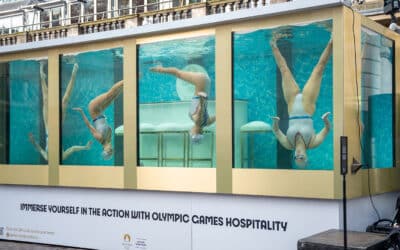In the first of a new series entitled ‘What I’ve Learnt’; Prolific North interviews Neil McKay, CEO of Lakestar McCann. Having began his adult life as a professional footballer, McKay has helped to build three successful companies and in 2012 he led the sale of Lakestar Media to the Interpublic subsidiary McCann Worldgroup.
Forty year old Neil McKay has experienced a varied life.
Born in Zimbabwe, his family emigrated just before the transfer of power from the Smith regime to the Mugabe regime.
 Settling in the UK, in Warrington, where there was family, he left school at 17 and became an apprentice footballer with Halifax Town where he stayed one season. When he wasn’t offered a new contract, the young McKay promptly looked elsewhere (a recurring characteristic) and unusually for a teenager, he opted to move abroad and spent the next two and a half years playing for a professional second division team in Austria called First Vienna.
Settling in the UK, in Warrington, where there was family, he left school at 17 and became an apprentice footballer with Halifax Town where he stayed one season. When he wasn’t offered a new contract, the young McKay promptly looked elsewhere (a recurring characteristic) and unusually for a teenager, he opted to move abroad and spent the next two and a half years playing for a professional second division team in Austria called First Vienna.
A subsequent dispute over his contract led to him returning to the UK but as First Vienna held his registration documents he was unable to resume his professional career and decided to change tack entirely.
As with many entrepreneurs, he started out in sales, selling display and classified ads for the Warrington Guardian where he quickly learnt from watching what was going on around him that, in the sometimes murky world of sales, to really succeed, it helps if you are known to be an honest operator.
“If you’re selling to people, you need them to be able to understand you, to trust you. Simple, honest and straightforward communication goes a really long way.”
Sales lessons learnt, time to move on
In 1996, having enjoyed a couple of promotions, he decided to move on and test himself with an advertising sales role at a magazine publishing company called Media Ventures group (MVG) which was itself owned by CI4net.
MVG began as a publisher of lifestyle magazines but the company’s ambitious and acquisitive owner, Dave Moran, an established entrepreneur had ambitions to rapidly grow the business and its portfolio of titles.
Having joined to increase the advertising revenue on the lifestyle titles, McKay was quickly brought into a senior management position to work primarily on new acquisitions.
Moran was building a nice niche buying up titles that had gone bump but had core assets that he believed, with a little TLC, could be resuscitated. McKay’s role was to go into the failed companies, restructure the operational and sales management, examine the cost base in minute detail and enhance revenues.
The new acquisitions saw him help to restructure three subsidiary companies in the UK and one in Germany.
The experience offered the young McKay an invaluable insight into how to quickly determine a company’s operational circumstances and assess how profitable it was, or should be.
Armed with this insight and a latent sense of doing something for himself, his growing sense of frustration came to head at a meeting in 2000 that McKay remembers vividly.
“I was in a meeting to discuss ‘web site build’ in what were still the early days of the web. In those days there could be up to 30 people in a room all giving their opinion and offering input into this new communication platform.
“This specific meeting concerned a £200k+ web site commission and I asked what I thought was a simple question relating to tracking response from a banner ad. The agency concerned in quite an offhand manner dismissed my enquiry as something that wasn’t possible and indeed my own colleagues shuffled in their chairs and sort of motioned that I shouldn’t ask such daft questions.
“But I knew that was rubbish. And it struck me very soon afterwards that if online was the way forward and people were becoming so confused by misinformation and trickery, then if I launched a service that was straightforward and transparent in its approach and delivery, I would be able to do well for others and make money for myself.”
However, before deciding to step out on his own, he felt he needed some additional first hand experience of how web companies did things so he resigned from MVG, took a 60% pay cut and joined a ‘web’ agency that was then called GMAPPS as a consultant.
Within 18 months, he’d made up his shortfall in pay and was in pole position when an MBO took place offering him his first taste of equity/management.
Following the MBO, he was appointed UK MD, based in Stretford, reporting in to the chief executive in Germany.
McKay then set about repositioning the company (renamed Global Media), away from its formative years as a web build company, and into one of the first digital companies to earn its crust from search, working with companies to improve their visibility on the ‘giants’ of the day…Alta Vista and Lycos.
Google was still in its infancy.
The plan agreed before the MBO was concluded, was that several new offices would be established, thereby achieving a critical mass which would be of interest to a US company looking for European expansion.
A clear and unambiguous plan
“There was a clear and unambiguous plan” said McKay, “something which ensured that we, as the management team, had a single, collective and achievable vision.”
McKay’s experience and expertise quickly lent itself to the new venture.
 Rather than opening with fully staffed office in each country, instead McKay and his chief executive focused on recruiting salespeople who were allocated a country to develop but who initially worked out of either the Manchester or German offices until they had built sufficient business to justify a physical office. In this cautious way, the operation grew and offices were subsequently established in Paris, Seoul, Stockholm, Moscow and Milan.
Rather than opening with fully staffed office in each country, instead McKay and his chief executive focused on recruiting salespeople who were allocated a country to develop but who initially worked out of either the Manchester or German offices until they had built sufficient business to justify a physical office. In this cautious way, the operation grew and offices were subsequently established in Paris, Seoul, Stockholm, Moscow and Milan.
As the business grew, so did awareness and in 2006, Global Media’s founding and guiding vision for the company came to fruition when, following a number of informal approaches, the private equity house Carlyle bought a controlling stake in the business.
Carlyle’s build and buy policy saw the subsequent reversal of Global into Big Mouth Media (BMM) based in Edinburgh and McKay became group commercial officer, working internationally for BMM and now working to VC-driven targets.
Over the next year, and once the initial integration phase had been completed, he decided to resign from BMM whilst still retaining a modest equity interest.
After taking some time out to recharge his batteries, he began a new career as a consultant to a handful of smaller digital agencies based largely in the North.
He was enjoying his new, more relaxed pace of life, when in late 2007 he was approached by some of his former BMM colleagues who were planning to set up their own digital agency, Lakestar.
They wanted him to join them.
However, rather than immerse himself entirely in another venture, he opted instead to help them as a consultant one day a week.
It’s hard to remain unattached
However, the consummate business builder within him found it hard to remain as – relatively – unattached as he’d imagined.
“I could see the potential of Lakestar but to make it successful in a way I believed was possible, I needed to have control to avoid the mistakes that entrepreneurs typically make: spending money unnecessarily, not looking after your cash and looking at the p&l in isolation and not the cash flow. And equally importantly, not thinking enough about which direction you should be heading in and how you’re going to get there.
“If the ultimate goal is to sell your business, then you need to put in place the steps you need to take to plan for that sale and consider who is likely to be interested in buying you and when.
“I knew how to make the jigsaw fit.”
Following several frank discussions, in September 2008 McKay took a 62% stake alongside seven other shareholders in what was then a loss-making agency.
 He also became the company’s sole director.
He also became the company’s sole director.
“We sat down and agreed that all our collective hard work should result in collective reward and we reflected on who might buy us. It was unlikely to be an SEO or other digital agency but more probably a traditional global agency seeking to enhance its skills and reach.”
McKay’s earlier experience of what VC’s and larger companies demanded, gave him the grounding to ensure that Lakestar would operate as a company that would be of interest to acquirers from the outset.
“Sustained compound annual growth in both revenue and EBITDA, quality of the client base, a clear focus on certain sectors, transparency of our accounts and, for the purposes of DD ( due diligence), everything kept scrupulously clean and properly recorded.
“We needed to be sure that client and staff contracts would stand up to DD, that our financial reporting would not be questioned and that we had no outstanding or buried away legal issues.
Planning for an exit helps ensure sound commercial practice too
“Not only was it essential if we were to fulfil our objective but it also proved to be good discipline for the company and the way we all strove to run the business.”
The early and clear focus on SEO and PPC paid off and a number of leading brands came through their doors including Halfords, Kuoni, Parcel2Go and Harley Medical.
Given Lakestar’s rapid emergence as a serious player in the sector, a steady trickle of approaches began to materialise but, said McKay, they were all too early in 2010. “We had only been trading for just over two years and we needed to be able to show at least four years of figures.”
However, the industry works in cycles he believes, typically three or five year cycles “and in early 2011 we could see the markets, both financial and the wider economy, were steadying again and although patchy, in some sectors were starting to show signs of solid growth again and a renewed appetite for matters digital and investment.
“In Q1 that year, we asked a corporate finance house, Results International in London, to start preparing us for a trade sale. They advised us we needed to complete that financial year and we agreed to meet again in July, when we went through a long list of potential acquirers – both trade and private equity.”
In September a single A4 sales memorandum was sent to the identified list and McKay then met with a number of interested parties to check out mutual ‘chemistry’ before some serious conversations began.
McKay was clear in what he was looking for: “A deal that would be right for our clients and was right for our colleagues.
“For clients, any deal would have to result in new, complementary services being added to their mix and for our colleagues, it was about allowing them to continue to grow their careers.
“If those two criteria were met, I knew it would be right for the shareholders.”
McCann’s Manchester operation, based at Prestbury in Cheshire, quickly emerged as the front runner. With over 250 staff, McCanns Manchester had the substance and appetite for taking on the responsibility for such a chunky acquisition.
McCanns is part of one of the world’s largest communications groups (Interpublic is listed on the NYSE) but it was without significant exposure to the SEO sector, particularly in Europe.
On 11 June 2012, a deal was struck although the amount paid and how the deal was structured was not disclosed to the market. Market observers however suggest the figure – once concluded – will be an eight figure number.
McKay and Lakestar McCann now report to the McCann Manchester board led by its chief executive Sue Little.
“Our clients now have access to off-line promotion and significantly TV, while Lakestar can extend its international reach with its own existing clients and also add value to existing McCann clients.
“Clients and colleagues were obviously keen to know how they were affected but once we showed them the positives, they were happy.
“On a personal level, I’ve also now got more support around me plus the ability to call on experts in several different fields of operations.”
For McKay, he’s now happy too to see his agency blossom into one of the UK’s and the world’s most respected search agencies. If this happens, then he and McCann will have between them seen the acquisition through to a mutually successful end.
And then?
“Who knows. I’ve never been the type of person who can think beyond my current project and this is a big project I am involved in right now and I’m enjoying every minute of it.”
And what has he learnt from this experience?
“The same as with my other start-ups and business building. You must have vision, clarity of mind, purpose and 100% focus.”










